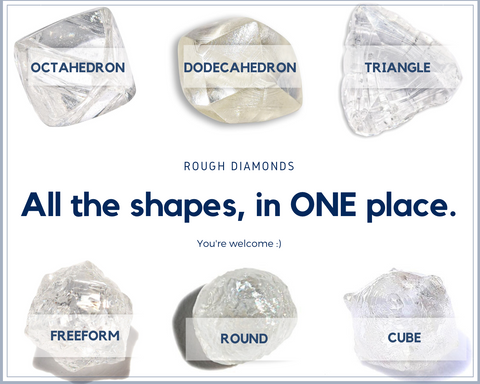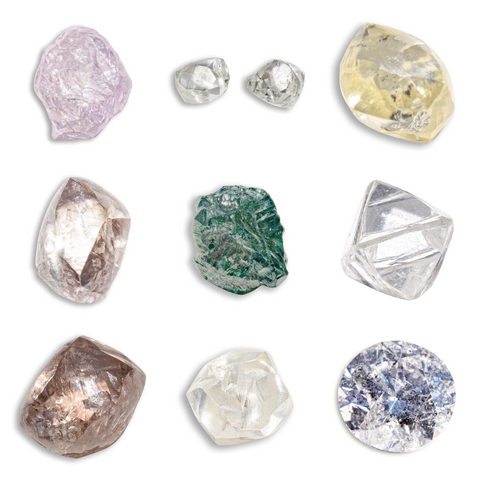You're ready to create a beautiful raw diamond engagement ring, but you have no idea how to choose that center rough diamond. Follow these steps to choose your perfect stone.
Now get started creating your ring >>
Before you start worrying too much about which stone to choose, know that we have done a lot of the legwork for you already! All our rough diamonds are chosen specifically to be used for engagement rings.
Step #1: Choose which shape you like the most.
You can filter our diamonds by shape, and it helps to know which shape you want in order to drill down to a smaller pool of diamonds to choose from.

- Octahedron: this shape is like two pyramids sitting on top of one another, base to base.
- Dodecahedron: this shape is generally flatter and more oblong with a diamond shape exposed at the top of the stone.
- Cube: you probably know what a cube is! Despite having such an exact shape, they tend to look very earthy.
- Round: these are rough diamonds that have a spherical structure
- Rough crystal: these are free-form shaped rough diamonds. They don't conform to any particular and exact shape and can be very interesting.
- Triangle: These are triangular rough diamonds, often called maccles. They tend to be very flat and clear.
Step #2: Choose which rough diamond color you like
Our rough diamonds come in a variety of earthy - and celestial - colors. Take a look at the options in front of you and choose which color resonates with you most.
- The highest value colors are clear (which we call 'white' in our descriptions), purple, pink, lighter champagne and fancy yellow. These colors tend to be translucent and full of light.
- Next are earthier and fancy colors that include greens, cognacs, darker champagnes, and some deeper yellows. These colors tend to be so intense and pervasive that the stone appears to be almost opaque.
- The third tier of colors are blacks, grays, browns and some earthy yellows. These colors are extremely representative of the earth that the stones are formed in, often with lots of interesting crystalline structures within to sparkle light in all direction.
Step #3: Choose your diamond's size
Now that you have an idea of the general "look" of the diamond. Pick a size that will look perfect for your ring concept:
- .50-1.0 carats is the smallest size range you should consider for a ring. This size looks excellent on thinner fingers, and is perfect for a delicate setting.
- The average stone size for an engagement ring is usually around a carat. This size is what we consider the ideal size for most ring designs and finger shapes.
- For a real statement piece and sizeable stone, choose a diamond that is over 1.5 carats.
A quick trick - use our dimensions in the product descriptions to sketch out a rough shape of the diamond, cut it out, and place it on your hand to view it. Or, place it on a band that is about 1.75mm - 2mm wide, and you can get a great idea of what that stone will look like in a typical setting.
Step #4: Look for additional characteristics
Compare similar rough diamonds by looking at a few different aspects of the stones:
- Inclusions - if you want your diamond to have tiny flecks of minerals trapped inside from their formation, then look for visible inclusions in the photos
- Sparkle - rough diamonds that have a more dimpled or rough surface will sparkle more because there are different angles to refract light
- Shine - rough diamonds that are smooth have a great deal of shine and will hold the light internally, often having a glowing effect
- Surface patterning - many rough diamonds have extremely interesting geometrical patterns on their surfaces that refract light and are generally cool to look at! Take a close look at our photos to see them, and we also mention these in our descriptions
Step #5: Go with your gut
Is there a diamond that you just keep going back to? It's probably the one.
There is no bit of advice greater than this that we can give you. Choosing a rough diamond for setting in jewelry, in the end, is completely subjective. Take the diamond that you love the most, it was clearly made for you.


0 comments